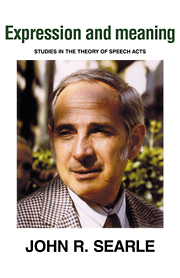2 - Indirect speech acts
Published online by Cambridge University Press: 05 June 2012
Summary
INTRODUCTION
The simplest cases of meaning are those in which the speaker utters a sentence and means exactly and literally what he says. In such cases the speaker intends to produce a certain illocutionary effect in the hearer, and he intends to produce this effect by getting the hearer to recognize his intention to produce it, and he intends to get the hearer to recognize this intention in virtue of the hearer's knowledge of the rules that govern the utterance of the sentence. But, notoriously, not all cases of meaning are this simple: In hints, insinuations, irony, and metaphor – to mention a few examples – the speaker's utterance meaning and the sentence meaning come apart in various ways. One important class of such cases is that in which the speaker utters a sentence, means what he says, but also means something more. For example, a speaker may utter the sentence “I want you to do it” by way of requesting the hearer to do something. The utterance is incidentally meant as a statement, but it is also meant primarily as a request, a request made by way of making a statement. In such cases a sentence that contains the illocutionary force indicators for one kind of illocutionary act can be uttered to perform, in addition, another type of illocutionary act.
- Type
- Chapter
- Information
- Expression and MeaningStudies in the Theory of Speech Acts, pp. 30 - 57Publisher: Cambridge University PressPrint publication year: 1979
- 32
- Cited by



